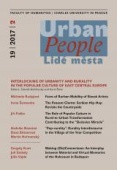“Pop-rurality”
Rurality Interdiscourse in the Village of the Year Competition
DOI:
https://doi.org/10.14712/12128112.3322Keywords:
rural anthropology, social representations, imagined rurality, discourse analysis, Czech RepublicAbstract
The Village of the Year in the Czech Republic is a national competition held since 1995, announced annually by the Ministry of Regional Development. Its aim is to promote the “restoration” and “development” of the Czech countryside through communal projects carried out by villagers themselves. Each year hundreds of Czech and Moravian villages enter the competition. Being focused on the countryside, the notion of rurality is one of the competition’s defining features. But what kind of rurality is it? What are its constituents? How it is performed in the village competition projects? And what are the sources of the forms it takes? Our analysis of media representations by village competitors (web sites, video presentations, etc.), alongside materials provided for competitors by the Ministry and other participating organizations (competition rules, official documents, etc.) and various media representations of the competition (television reports, etc.), reveals how the discourses involved operate and how they create a certain “ideal” village that is to be seen as a model to be followed. We argue that the several discourses of rurality interwoven in the representations of villages within the competition (those of experts/academics, public/media, villagers, and policymakers) form an interdiscourse of “poprurality”, which is a rurality deterritorialized, enriched with shared global (pop‑cultural) elements, and re-territorialized again, to then float freely in public (especially virtual) space.
Downloads
Published
How to Cite
Issue
Section
License

This work is licensed under a Creative Commons Attribution-NonCommercial-NoDerivatives 4.0 International License.



